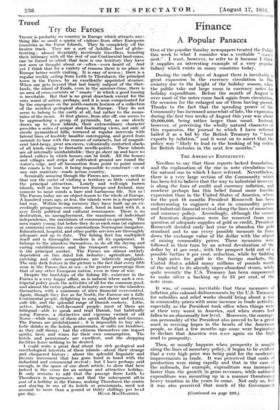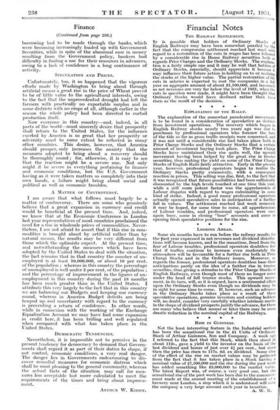Finance
A Popular Panacea
ONE of the popular Sunday newspapers treated the Public this week to what I consider was a veritable "mare's rieat.", I want, however, to refer to it because I think it ,_supplies an interesting example of a very popular fallacy which exists in many countries today.
. During the early days of August there is inevitably a great expansion in the currency circulation in this Country due to the height of the holiday season, when the Public take out large sums in currency notes for holiday' expenditure. Before the month of August is over most of the notes come back again from circulation, the occasion for the enlarged use of them having passed. Thanks to the fact that the spending power of the Community has increased somewhat of late, the expansion during the first two weeks of August this year was about £9,000,000, being rather larger than -usual. Instead, however, of perceiving the wholly natural character of this expansion, the journal to. which I have referred hailed' it as a bid by the British Treasury to "boost exports by inflation," and it went on to assert that the policy. was "likely to lead to the booking of big orders for British factories in the next few months."
. „ THE AMERICAN EXPERIMENT.
Needless to say that these reports lacked foundation. and the explanation of the rise in note circulation was the natural one to which I have referred. Nevertheless, there is a very large section of the Community which has been led to believe that the way to industrial recovery is along the lines of credit and currency inflation, and nowhere perhaps has this belief found more forcible expression than in the United States of America, where for the past 18 months President Roosevelt has beets endeavouring to engineer a rise in commodity prices and industrial financial revival along the lines of monetary and currency policy. Accordingly, although the causes of American depression were far removed from any question of adequate supplies of gold, or credit, President Roosevelt decided early last year to abandon the -gold standard and to use every possible measiire ,to force down the exchange value of the dollar .with."-te object of raising commodity . prices. *These measures were followed in their turn by an actual devaluation of the dollar by 41 per cent.; with. the prospect held, out of a possible further 9 per cent. reduction, while by bidding a high price for gold in the foreign . markets, the United States added many millions of pounds worth of the metal to its already -sUper:abundant stores, 'while quite recently the U.S. Treasury has been empowered to make silver a backing up to 25 per cent. of the note issue. .
It was, of course, inevitable that these measures of inflation plus colossal disbursements by the U.S: Treasury for subsidies and- relief works should bring about- a rise in commodity prices with some increase in trade activity, especially as the President took office when things were at their very worst in Atherica, and when stores had fallen to airabnOrmally low level. Moreover, the courage- ous personality of -the President also, proved to be _ al great asset in reviving _hopes in the hearts of thel American people, so that a few months -ago some were -beginning to 'declare that America was ()Ace again on the high road to prosperity.
Then, as usually happens when : prosperity is sought along 'the lines of monetary policy,, it began to be evident that' a' very high price NVat -being paid for the moderate improvements in trade. It was perceived that costs of production were rising rapidly and that in the case of the railroads,- for example, expenditure was increasing faster than the growth in-gross revenues, while national expenditure was mounting up in a manner threatening heavy taxation in the years to come. Not only so, but it was also perceived that much of :the Govenunent . - (Continued on page 288.)
Finance
(Continued from page 236.)
borrowing had to be made through the banks, which were becoming increasingly loaded up with Government Securities, while in spite of the abnormal ease in money resulting from the Government policy, bankers had difficulty in finding a use for their resources in advances, owing to a lack of confidence in a long continuance of activity.
SPECULATION AND PRICES.
Unfortunately, too, it so happened that the vigorous efforts made by Washington to bring about through artificial means a great rise in the price of Wheat proved to be of little value to the agricultural interests, owing to the fact that the unprecedented drought had left the farmers with practically no exportable surplus and in some districts with no crops at all, although earlier in the season the whole policy had been directed to curtail production itself. Now everyone in this country—and, indeed, in all parts of the world—must sincerely desire that prosperity shall return to the United States, for the influence exerted by America is so great that her prosperity or adversity must to some extent be reflected in many other countries. This desire, however, that America should prosper, only increases the anxiety that the measures adopted to bring about a recovery should be thoroughly sound ; for, otherwise, it is easy to see that the reaction might be a severe one. Not only might it be severe in everything pertaining to finance and economic conditions, but the U.S. Government having as it were taken matters so completely into their own hands, a failure might bring about social and political as well as economic troubles.
A MATTER OF CONTROVERSY.
I am aware that what follows must largely be a matter of controversy. There are some who genuinely believe that a great expansion in currency and credit would be beneficial at the present time. And, indeed, we know that at the Economic Conference in London last year representatives of most countries proclaimed the need for a rise in wholesale prices of commodities. Never- theless, I am not afraid to assert that if this rise in com- modities is brought about by artificial rather than by natural means, the results may be very different from those which the optimists expect. At the present time, and notwithstanding the measures which have been adopted by the United States to deal with the situation, the fact remains that in that country the number of un- employed is at least 10,000,000, or about 10 per cent. of the population ; whereas in this country the percentage of unemployed is well under 5 per cent, of the population ; and the percentage of improvement in the figures of un- employment in this country during the past 18 months has been much greater than in the United States. I attribute this very largely to the fact that in this country we are balancing our Budgets and keeping our currency sound, whereas in America Budget deficits are being heaped up and uncertainty with regard to the currency is preventing a return of confidence. In other words, while in connexion with the working of the Exchange Equalization Account we may have had some expansion in credit here, it has been trifling and well regulated when compared with what has taken place in the United States.
DEMOCRATIC TENDENCIES.
Nevertheless, it is impossible not to perceive in the present tendency for democracy to demand that Govern- ments shall regard it as part of their duties to shape, if not control, economic conditions, a very real danger. The danger lies in Governments endeavouring to dis- cover remedial measures for economic distress which shall be most pleasing to the general community, whereas the actual facts of the situation may call for mea- sures less acceptable but more calculated to meet the requirements of the times and bring about improve- ment.
ARTHUR W. KIDDY.



































 Previous page
Previous page